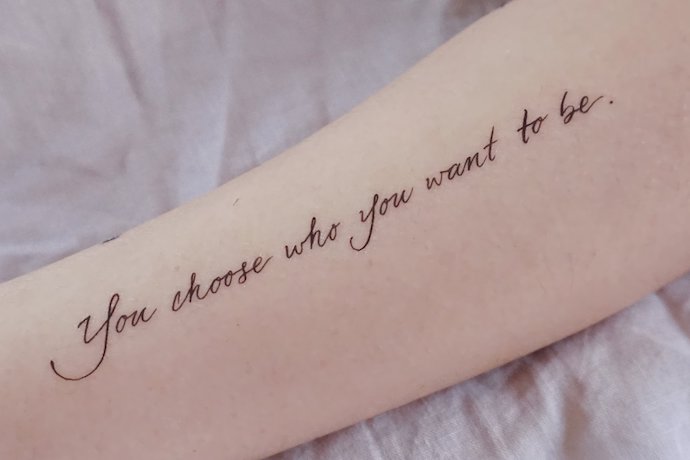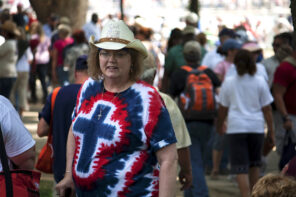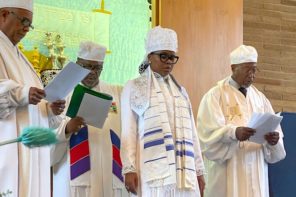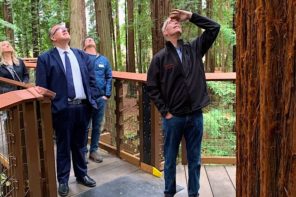Recently, Atlantic writer Derek Thompson tweeted an image of two graphs of religious survey data. The first showed the number of people who say they “believe in God without a doubt,” broken down by generation: Gen Z numbers drop off precipitously since the late nineties. The second showed the number who say they “believe in some higher power.” Here, Gen Z showed an equally precipitous rise, since around 2012. Thompson’s tweet betrays some exasperation with the apparently contradictory results: “Depending on how you ask the question,” he wrote, Gen Z was either “leading a stunning atheist revolution, or they’re extremely spiritual people without an organized religion to claim for themselves.”
But the graphs, made by political scientist of religion Ryan Burge using GSS data, are only contradictory if you read them from a limited, Christian-centric perspective. Asking about belief “without a doubt” implies that belief and doubt are mutually exclusive, not a pair of related and often fluctuating mental habits. The concept of “some higher power,” while assuming a theological hierarchy that’s not relevant to all traditions, seems to be perceived as a larger category than “God,” and thus an easier proposition for some Gen Z survey subjects to sign onto.
Neither are Thompson’s terms—“atheist” and “spiritual”—contradictory. “Spiritual,” an impossible-to-define term, does not require belief in God, although it can also describe a level of devotion within a religious tradition. Questions like these focus on “belief.” The recent Public Religion Research Institute (PRRI) “Census of American Religion” focuses largely on “affiliation.” But both “belief” and “affiliation” are poor proxies for how something called religion exists in the world.
The inadequacy of measuring belief and affiliation is especially apparent when we are talking, as we often are, about the “nones.” That term, it’s worth repeating, refers to people who check “none of the above” when given a list of religious terms with which to affiliate. It’s true there are real people who describe themselves as “nones.” To learn about some of them, I recommend Kaya Oakes’s thoughtful study The Nones Are Alright. The refusal to religiously label oneself also has a long and deep American history. But shouldn’t the existence of the “nones,” and the purported “rise” or “fall” of their numbers, tell us just as much about the limitations of the other options for “affiliation” on that list? And maybe even about the limitations of “affiliation” and “belief” in general? Here are three of those limitations.
Practice, Practice, Practice. Say it with me: religion is less about what you believe than what you do. Indeed, when it comes to observing how something called “religion” shows up in the world, practice is all we have to go on. You cannot get inside someone else’s head. Yet we persist in defining religion as a “belief system.”
One of my favorite ways to demonstrate the absurdity of this is Beliefnet’s “Belief-O-Matic” quiz. You answer a series of strictly theological questions: about the existence of supernatural entities, what it means to align oneself with those entities; what happens after we die. Then it assigns you an affiliation based on your declared beliefs. I usually end up around 40% Hindu and 60% Quaker, neither of which religious tradition I have any personal connection to.
The cognitive dissonance forces us to notice the many other practices we use to define religiousness: by the family that we were born or raised in, by what kind of prayers we say, by the church we attend, or don’t. Which brings me to my second point.
It’s Complicated. Even if we ask about practice instead of belief, the answers don’t do justice to the complexity with which most people “do” religion (or not). It’s easy to fall into authenticity traps when asking “how many times a day you pray?” or “how often you attend a house of worship?” The answer to the latter question is notoriously dependent on whether a live person is asking the question: in the U.S., a high percentage of people apparently think they should be attending religious services.
And here again, thinking this way can privilege certain ways of being religious: What if prayer is silent or ongoing in your practice, or what if there is no house of worship? And there is no straight line between quantity of practice and self-identified quality of religiosity. What if I just really love Catholic Mass although my family is Jewish? What if the more I pray the more I doubt? (Do you know anyone who is really “without a doubt”?)
The appropriate genre to express the kind of complex relationship many individuals have with something called “religion” isn’t survey data but literary journalism. The online religion magazine Killing the Buddha (shameless plug), founded in 2000 by Jeff Sharlet and Peter Manseau for people who are “both hostile and drawn to talk of God,” has survived and thrived because that mix continues to be fascinating.
Freedom of Choice. My third limitation of measuring “affiliation” is a hard one for Americans to accept: Religious affiliation is not solely a matter of individual choice. The notion that we are all autonomous entities able to freely move toward enlightenment using whatever religious or non-religious beliefs and practices we select for ourselves has always been more ideal than real—and once again more Protestant than not.
For one thing, who counts as “affiliated” varies widely by tradition and perspective. I might not affiliate myself with Judaism in a survey, but if we’re counting people whose mothers are Jewish, I go on that list. Some Catholic parishes continue to count anyone baptized or confirmed there as “Catholic” no matter where those individuals are now or what they’ve gone on to choose. As Megan Goodwin and Ilyse Morgenstein Fuerst like to say on their essential religion podcast, Keeping it 101: “even if you’re done with religion, religion is not done with you.”
For another thing, many non-white Americans have their religious identity racialized, and vice versa. Anyone who “reads” as Muslim can be subject to Islamophobic violence, no matter what they believe, or practice, or don’t. Consider the way that racist Islamophobic violence has been directed against Sikh Americans, or how Buddhist temples are targets of anti-AAPI violence. Religious choice is, on some level, a white privilege.
So “belief” is inaccessible and exists in a complex relationship with practice; and our own religious “affiliation” or lack thereof doesn’t necessarily count for much in the world at large. Why then do we persist in trying to count American religion? My goal isn’t to get rid of these surveys, but to look at them differently. They are indeed “data,” but not in the way they purport to be. There may not be any solid, observable referent for the numbers of young people who say they “believe” in some kind of “higher power.” But that does not mean we shouldn’t ask. Any survey is a snapshot of a moment, in which the questions reveal as much as, if not more than, the answers.





